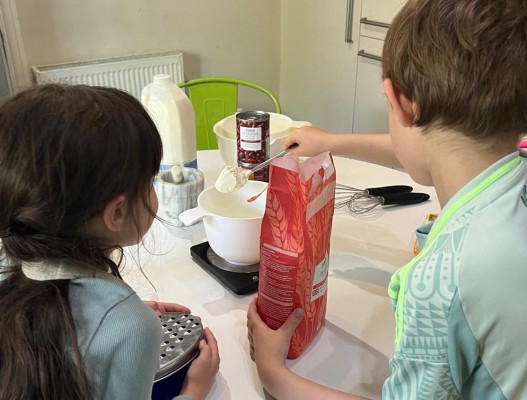The “Make a Meal Monday” Experiment: Cultivating Change Through Connection and Curiosity

In psychology, when faced with a challenge, we often turn to experimentation, not just in labs, but in life. Experiments allow us to try something new, observe the results, and reflect on what works. This mindset of curiosity, rather than control, can be a powerful tool for transformation.
One such challenge recently presented itself in my own home: how to meaningfully shift my children’s beige diet. As a mother of three children (each with their own unique relationship with food) this wasn’t a small ask. One is extremely selective, another is moderately flexible, and my youngest is profoundly impacted by autism, with such a restricted diet he likely meets the criteria for "Avoidant/Restrictive Food Intake Disorder" (ARFID). Like many parents, I know that nutrition is foundational for physical and emotional well-being. But knowing and doing are two very different things, especially when it comes to feeding children.
So, I created an experiment: the “Make a Meal Monday” experiment.
This was not about control or compliance. It was about engagement:
- Could involving my children in the process of cooking foster a shift, not just in what they ate, but in how they related to food?
- Could it transform our mealtimes from battlegrounds into moments of connection?
The Psychology of Food and Change
Psychological research affirms what many parents intuitively know: mealtimes are about much more than just nutrients. They’re opportunities for bonding, learning, and emotional nourishment. According to Ellyn Satter, a pioneering dietitian and family therapist, a healthy feeding relationship is just as important as a healthy diet. Her 'Division of Responsibility' model stresses the parent’s role in providing structured, reliable meals and the child’s role in deciding what and how much to eat from what’s offered (Satter, 2000).
When mealtimes become arenas of control...“just try one bite,” “you have to finish your vegetables”...we inadvertently set the stage for power struggles, anxiety, and aversion. Conversely, when children are invited into the process with curiosity and autonomy, they’re more likely to explore new foods and develop a healthy relationship with eating (Birch & Fisher, 1998).
Why Cooking Together Matters
Inviting children into the kitchen is a strategy grounded in research. Studies show that when kids are involved in food preparation, they are significantly more likely to try new foods (van der Horst et al., 2014). Cooking increases familiarity and reduces anxiety around novel textures and smells. It also fosters a sense of agency—a vital ingredient in motivation and behaviour change.
Moreover, shared food preparation is a relational act. It shifts the family dynamic from “mealtime as a task” to “mealtime as a shared experience”. For children, especially those with developmental or sensory challenges, this relational scaffolding can make new experiences feel safer and more manageable.
Small Wins, Big Impact
In behaviour change theory, small wins matter. Motivational Interviewing, a counselling approach used to facilitate change, emphasises meeting people (and children) where they are, rather than where we wish they would be (Miller & Rollnick, 2013). For my family, this means not expecting my children to accept a wide variety of foods. It means focusing on what is possible now: nurturing interest, modelling joy around food, and creating a culture where meals are not feared but shared.
The goal isn’t perfection - it’s participation. Choosing a vegetable, chopping a carrot, stirring a sauce; these moments are small victories that signal a shift. A shift not only in behaviour, but in attitude.
Reclaiming the Table
After years of working with eating disorders, I understand the long-term consequences of an adversarial relationship with food. Disordered eating often has roots in early experiences where food was tied to control, shame, or anxiety. My hope as a parent is to foster something different, where meals are enjoyable, relationships are prioritised, and food is seen as both fuel and pleasure.
So far, the Make a Meal experiment has offered glimmers of hope. There have been messes, resistance, and the occasional uneaten dish; but also laughter, curiosity, and a few surprising bites. And that’s the point. Not transformation overnight, but transformation over time.
Because when it comes to parenting, as in psychology, meaningful change often starts not with force, but with an invitation.
By Dr Georgina Taylor-Adriaansen
References:
Birch, L. L., & Fisher, J. O. (1998). Development of eating behaviours among children and adolescents. Pediatrics, 101(Supplement 2), 539–549.
Ellyn Satter Institute. (2000). Division of Responsibility in Feeding. Retrieved from ellynsatterinstitute.org
Miller, W. R., & Rollnick, S. (2013). Motivational Interviewing: Helping People Change (3rd ed.). Guilford Press.
van der Horst, K., Ferrage, A., & Rytz, A. (2014). Involving children in meal preparation: Effects on food intake. Appetite, 79, 18–24.
